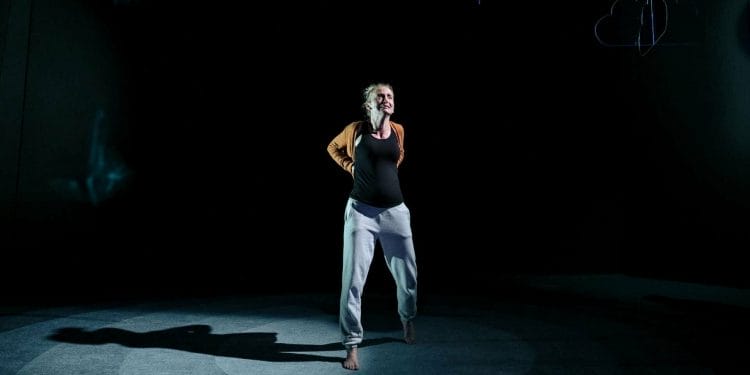 Morgan Lloyd Malcolm’s new play Mum, playing at the Soho Theatre, runs at only 60 minutes. It’s surprising, therefore, that quite so much is packed into the play – the full gamut of human emotion encased in one dazzling showcase for performer Sophie Melville.
Morgan Lloyd Malcolm’s new play Mum, playing at the Soho Theatre, runs at only 60 minutes. It’s surprising, therefore, that quite so much is packed into the play – the full gamut of human emotion encased in one dazzling showcase for performer Sophie Melville.
The plot is hard to describe fully without spoiling the nature of the play – Nina is a new mother to three-month-old Ben, dealing with her first night separated from her baby, who will be spending the night with her husband and mother-in-law, the interfering and slyly judgemental Pearl.
While sharing drinks with her support worker, turned friend, Jackie, she nonchalantly says something contentious. Nina isn’t saying she’d ever harm baby Ben – in fact, the play centres around the undying love and need Nina has for her child.
Nonetheless, Nina’s behaviour’s been erratic since the death of her mother, and when the rug is pulled out from underneath the characters (and the audience) around ten minutes in, we see a new mother’s worst fear exploding onstage. With beautiful, poetic writing from Morgan Lloyd-Malcolm, unafraid to delve deep into a fragile psyche, the play is a masterclass in showing how one moment can tear an entire world apart.
Sophie Melville is an absolute revelation as Nina. Her impressive physicality, utilised frequently in the play to express Nina’s pain and frustration, is the perfect complement to her fearlessness onstage. She’s fraught, tired, broken but fighting, and Melville hits every beat perfectly.
As Jackie, Cat Simmons has significantly less to do, but she still manages to pull off an impressive balancing act, showing determination and guilt in doing the right thing, even if it means hurting her friend in the process.
Rounding out the cast is Denise Black, playing the dual role of Pearl and Nina’s deceased mother in flashbacks. As can be expected with an actress of Black’s calibre, she nails everything that’s expected her – always funny, frequently heart-breaking, sinking her teeth into both roles with muster and power.
The play creates a sort of microcosm onstage – the set is minimal, extravagant lighting is sparingly used, and there’s really only one or two major props used throughout the piece. Abigail Graham, the director, makes it clear that we’re not here to watch a lavish, four-act Chekhov play – this is a story about a mother’s worst nightmare, and we’re going to sit with her for every one of those sixty minutes, living the nightmare with her.
Graham wisely keeps the pace rapid, almost break-neck throughout, allowing the characters to slip up and make us question who’s telling the truth in this messy, ugly story. The seemingly naturalistic play collapses as it progresses, becoming more absurd and less linear as Nina’s mental state deteriorates, and Graham’s deft handling of the changing reality keeps us on our toes, asking questions and drawing our own conclusions.
Even with the fast pace, the play does feel a little unfinished – it’s perfectly fine to leave audiences to draw their own conclusions, but the final minutes of the play leave a number of dangling plot threads and ideas, and perhaps it could have benefited from a little more simplicity.
Mum isn’t what you’d expect. It’s uncomfortable, sometimes outright shocking, and beautifully performed. Don’t expect too many answers, but prepare to ask some hard questions once the play’s wrapped up.























Comments 1